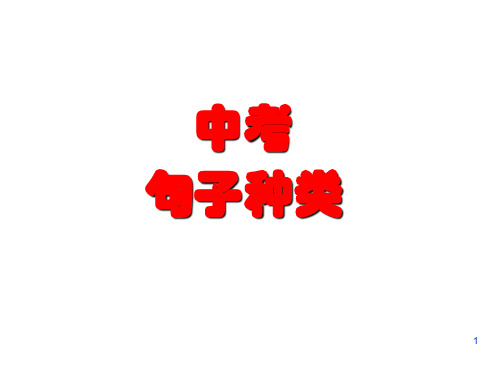初中英语句子种类讲解(PPT52张)
合集下载
句子的种类(50张PPT)初中英语专项复习课件

2.一般疑问句的回答 一般疑问句的肯定回答通常用“Yes,主语+be动词/情态动词/助动词”; 否定回答通常用“No,主语+be动词/情态动词/助动词+not”。not 习 惯上与前面的be动词、情态动词或助动词构成缩写词,但是be动词am 除 外。
三、选择疑问句 1.选择疑问句的回答 选择疑问句一般不用yes或no回答,而是选择一种情况回答。如: —Which one do you prefer,the red one or the blue one? 你更喜欢哪一件,红色的还是蓝色的? —I prefer the red one.我更喜欢红色的。
3.表示部分否定的词,如not all,not everything,not everybody,not everywhere,not always等。如: Not all students go to school by bike.不是所有的学生都骑自行车上 学。 4.宾语从句的否定形式:当主语为第一人称,谓语为 think,believe,suppose等词时,形式上否定主句实则否定宾语从句。如: I don’t think he’ll come. 我认为他不会来。
答案 A
解析 考查动词时态,本句为陈述句。句意:自从我来到长沙我们就没见过
面,但我们经常发邮件。根据since I came to Changsha可知,句子时态
为现在完成时,其构成为:have/has+动词过去分词,故选A项。
考点清单
分类
意义
肯定句
表示肯定的陈述
否定句
表示否定的陈述
例句
I get up at 6 o’clock every morning. 我每天早上六点起床。
中考英语句子结构和种类 (共54张ppt)

(5) 介词短语 The six students kept their hands behind their backs . 这 六个 学生 把 手背 在 后面 。
【非常 练 习】
( )1. It _____ outside. I have to stay at home.
A. rain
B. is raining
Your watch looks very nice. 你 的 表 很 好 看。
(4) 主 + 谓 (vt)+ 双 宾 I ’ ll show you my photos./I ’ ll show my photos to you. 我准备给你 看 我 的 照片 。
(5) 主 + 谓 (vt)+ 宾 + 宾 补 At first I found Chinese very hard. 刚开始我发现 中 文 很 难 。
感叹句 表示说话时的某种强烈 Howwonderfulitis!
感情。
妙极了!
so特殊 句型
表示“……也是”或 “赞同”
Ilikemusic.Sodoesmy sister.我喜欢音乐,我姐姐 也是。
Ⅴ . 非常讲解
【中考考点】
A 陈述句
1. There goes the bell. 铃声响了 。
Let ’ s not waste our time arguing about it. 我们 不 要 为这 件 事 情 争论 不 休浪费 时 间 了 。
【非常练习】
I. 按要求改写句子。 1. If we don ’ t hurry, we ’ ll be late. ( 改 为 祈 使句 ) Hurry up, or we ’ ll be late. 2. Be careless. ( 改 为 否定 句 ) Don ’ t be careless.
【非常 练 习】
( )1. It _____ outside. I have to stay at home.
A. rain
B. is raining
Your watch looks very nice. 你 的 表 很 好 看。
(4) 主 + 谓 (vt)+ 双 宾 I ’ ll show you my photos./I ’ ll show my photos to you. 我准备给你 看 我 的 照片 。
(5) 主 + 谓 (vt)+ 宾 + 宾 补 At first I found Chinese very hard. 刚开始我发现 中 文 很 难 。
感叹句 表示说话时的某种强烈 Howwonderfulitis!
感情。
妙极了!
so特殊 句型
表示“……也是”或 “赞同”
Ilikemusic.Sodoesmy sister.我喜欢音乐,我姐姐 也是。
Ⅴ . 非常讲解
【中考考点】
A 陈述句
1. There goes the bell. 铃声响了 。
Let ’ s not waste our time arguing about it. 我们 不 要 为这 件 事 情 争论 不 休浪费 时 间 了 。
【非常练习】
I. 按要求改写句子。 1. If we don ’ t hurry, we ’ ll be late. ( 改 为 祈 使句 ) Hurry up, or we ’ ll be late. 2. Be careless. ( 改 为 否定 句 ) Don ’ t be careless.
初中英语句子结构句子成分讲解ppt课件

* The question who should do the work requires consideration.
* Mother made a promise that she would buy me a new coat.
可编辑课件PPT
23
注意!
引导词that & what
* that与what都可以引导名词性从句。 * what在从句中充当句子成份(主,宾,表)。 * That在句中只起连接作用,不充当成份。 * that在引导名词性从句时不可省略(宾语从句除外).
常用的关联词有:so, so that, in order that
可编辑课件PPT
17
6) 条件状语从句
If it snows tomorrow, we will build a snowman.
常用的关联词有:if, unless, in case that, on condition that…
可编辑课件PPT
20
2)表语从句
* That is what he wants to buy. * The problem is that who we can get to replace her? * The reason is that he has lied to me several times.
主 + 谓 + 宾 + 宾补
可编辑课件PPT
12
Ⅱ.并列句
This is me and these are my friends. They must stay in water, or they will die. It’s not cheap, but it is very good. It was late, so I went to bed.
* Mother made a promise that she would buy me a new coat.
可编辑课件PPT
23
注意!
引导词that & what
* that与what都可以引导名词性从句。 * what在从句中充当句子成份(主,宾,表)。 * That在句中只起连接作用,不充当成份。 * that在引导名词性从句时不可省略(宾语从句除外).
常用的关联词有:so, so that, in order that
可编辑课件PPT
17
6) 条件状语从句
If it snows tomorrow, we will build a snowman.
常用的关联词有:if, unless, in case that, on condition that…
可编辑课件PPT
20
2)表语从句
* That is what he wants to buy. * The problem is that who we can get to replace her? * The reason is that he has lied to me several times.
主 + 谓 + 宾 + 宾补
可编辑课件PPT
12
Ⅱ.并列句
This is me and these are my friends. They must stay in water, or they will die. It’s not cheap, but it is very good. It was late, so I went to bed.
句子的种类(20张PPT)初中英语专项复习课件

他?
(2)特殊疑问句
用特殊疑问词(组)引导的疑问句叫作特殊疑问句,回答时不能使用yes或no,
而是根据实际情况作答。
疑问词(组)
含义及用法
例句
who which what
“谁”,询问身份
“哪一个”,询问特定的人或 物 “什么”,询问职业或身份等
Who is the man under the tree? 树底下的那个男人是谁? Which book do you like?你喜欢 哪一本书? —What is he?他是干什么的? —He's a teacher.他是一名教师。
句子的种类
初中英语专项复习
1.陈述句
构成
谓语动词不含否定词。分为两 肯定 形式 种,一种为正常语序,一种为倒
装语序
例句 ①My parents are both doctors. 我的父 母都是医生。 ②In the center of the city is a big park.这个城市中心有一个大公园。
Tom doesn't like playing the piano. 汤 姆不喜欢弹钢琴。
构成 除not外,使用其他否定词也可构 成否定句,如no,never, 否定 形式 seldom,hardly,nothing, neither,nobody,few,little, nhave never been to Shanghai. 我从 来没有去过上海。 ②None of these pens works/work. 这 些钢笔没有一支能用。
11.(2023吉林改编)—__H_o_w__f_a_r_ is it from our school to the new bookstore, Li Lei? —Only one kilometer. 12.(2023营口改编)—Lingling, _h_o_w___s_o_o_n_ will your brother come back from abroad? —Hmm, in a week. 13.(2023宿迁改编)—China won all the gold medals at the 2023 World Table Tennis Championships. —_W__h_a_t_exciting news!
专题一 初中英语句子成分及基本句型PPT课件

1
句子成分
Parts of the Sentence
第1页/共53页
2
概念:组成句子的各个部分, 即主语、谓语、宾语、表语、 宾语补足语、定语和状语, 主语和谓语是句子的主体部分。
第2页/共53页
句子成份
★ 句子一般由两个部分组成:
主语部分( subject group) 谓语部分( predicate group)
27
第27页/共53页
形容词作表语 You look younger than before. 名词作表语
My father is a teacher. 副词作表语 Everyone is here. 介词短语作表语 They are at the theatre. 不定式作表语 My job is to teach them English. 动名词作表语 Her job is training the nurses. 从句作表语 That is why he didn’t come to school yesterday.
16
第16页/共53页
He is very generous. She looks very smart and cool We have finished the job. He can speak German.
17
第17页/共53页
谓语(predicate):是对主语加以陈述, 表示主语的行为或状态,常用动词或者动 词词组担任,放在主语的后面。
8
第8页/共53页
•To see is to believe. (不定式)
•What he needs is a book.
形式主语
(主语从句)
•It is very clear that the elepha
句子成分
Parts of the Sentence
第1页/共53页
2
概念:组成句子的各个部分, 即主语、谓语、宾语、表语、 宾语补足语、定语和状语, 主语和谓语是句子的主体部分。
第2页/共53页
句子成份
★ 句子一般由两个部分组成:
主语部分( subject group) 谓语部分( predicate group)
27
第27页/共53页
形容词作表语 You look younger than before. 名词作表语
My father is a teacher. 副词作表语 Everyone is here. 介词短语作表语 They are at the theatre. 不定式作表语 My job is to teach them English. 动名词作表语 Her job is training the nurses. 从句作表语 That is why he didn’t come to school yesterday.
16
第16页/共53页
He is very generous. She looks very smart and cool We have finished the job. He can speak German.
17
第17页/共53页
谓语(predicate):是对主语加以陈述, 表示主语的行为或状态,常用动词或者动 词词组担任,放在主语的后面。
8
第8页/共53页
•To see is to believe. (不定式)
•What he needs is a book.
形式主语
(主语从句)
•It is very clear that the elepha
初中英语句子成分讲解PPT课件

句子的成分
主语
表示句子所说的是 “什么人”或“什么事物”
• 主语(subject):主语是一个句子所叙述的
主体,一般位于句首。
Gina is from Australia.
-名词
She often goes to the movies. -代词
Three is enough.
-数词
Doing the work is hard for him. -动名词
To see is to believe.
-不定式
What he needs is a book.
-主语从句
介词短语,形容词,动词原形等不能作主语。
谓语(predicate)
谓语说明主语所做的动作或具有的特征和状态。动词
在句中作谓语,一般放在主语之后。谓语的构成如下:
• 1、简单谓语:由一个动词或动词短语构成。
系动词
状态系动词 表示主语状态、身份等,主要有be。
I am hungry.
持续系动词 表示主语继续或保持一种状况或态度,主要有keep, remain, stay等
He always kept silent at meeting. 感官系动词 主要有feel, smell, sound, taste, look
4 He likes watching TV.
5. He is looking at the dog.
6. She thinks (that) reading books is very relaxing.
表语(predicative)
表语用以说明主语是什么或怎么样, 它一般位于系动词之后。
1 I am a teacher. (名词) 2 I am ten. (数词) 3 He became rich and successful. (形容词) 4 Everyone is here. (副词) 5 They are at home now. ( 介词短语) 6 My job is to teach them English. (不定式)
主语
表示句子所说的是 “什么人”或“什么事物”
• 主语(subject):主语是一个句子所叙述的
主体,一般位于句首。
Gina is from Australia.
-名词
She often goes to the movies. -代词
Three is enough.
-数词
Doing the work is hard for him. -动名词
To see is to believe.
-不定式
What he needs is a book.
-主语从句
介词短语,形容词,动词原形等不能作主语。
谓语(predicate)
谓语说明主语所做的动作或具有的特征和状态。动词
在句中作谓语,一般放在主语之后。谓语的构成如下:
• 1、简单谓语:由一个动词或动词短语构成。
系动词
状态系动词 表示主语状态、身份等,主要有be。
I am hungry.
持续系动词 表示主语继续或保持一种状况或态度,主要有keep, remain, stay等
He always kept silent at meeting. 感官系动词 主要有feel, smell, sound, taste, look
4 He likes watching TV.
5. He is looking at the dog.
6. She thinks (that) reading books is very relaxing.
表语(predicative)
表语用以说明主语是什么或怎么样, 它一般位于系动词之后。
1 I am a teacher. (名词) 2 I am ten. (数词) 3 He became rich and successful. (形容词) 4 Everyone is here. (副词) 5 They are at home now. ( 介词短语) 6 My job is to teach them English. (不定式)
初中英语非谓语动词之现在分词和过去分词非谓语动词语法讲解ppt 共52张

D. to practice to play
24
【考点精练3】
( ) 5.When you are tired,_______ in the countryside is a wonderful experience.
A. relaxing
B. relaxed
C. relax D. relaxes
D. walking;
21
【课中练习检测】
( D )1. I will try my best to stop my son from ________ the same mistake.
A. make
B. made
C. makes
D. Making
( D )2. Seeing their teacher ____ into the classroom,they stopped_____ at once.
B. to change; doing D. change; doing27【考点精练3】
( D )7. —I tried to make Alice ________ her mind but I found it difficult.
—Well,I saw you ________ that when I went past.
experience.
A. relaxing
B. relaxed
C. relax D. relaxes
D
( )6. We have worked so long.Shall we stop ________ a rest?
A. have
B. to having C. having D.to have
完成做某事 练习做某事 考虑做某事 禁不住做某事 忙于做某事 放弃做某事
初中英语 中考语法专项 句子种类讲解课件

多少 (可数名词)
多少 ( 不可数名词) 多大 (岁数) 多高 (人 树) 多久(时间)或多长(长度) 多久( 频率) 多快 (时间) 多远(距离) 多高 ( 山 )
24
❖ 3.选择疑问句 用来在两种或两种以上情况中进行选择的疑问 句叫作选择疑问句。答语不能用yes或no回答。 ❖ Are you a teacher or a doctor? ❖ Do you like Coke or juice? ❖ Shall we go there by bus or taxi?
25
❖ Are you a teacher or a doctor? 1. I am a teacher. 2. I am a doctor. 3. Neither. I am a driver.
26
❖ Do you like Coke or juice? 1. I like Coke. 2. I like Juice. 3. Either is ok. 4. Neither. I likee词或助动词的句子中, 需要借助助 动词do/does/did, 然后再加not。 I go to school on foot. I do not (don't) go to school on foot. The English begins at 8 every day. The class does not(doesn't)begin at 8 every day. They did their homework last night. They did not(didn't) do their homework last night.
27
11
❖ (3)有些可用no开头,用来表示禁止性。 ❖ 结构:No + 名词/动名词! ❖ No photos! ❖ No pets! ❖ No smoking! ❖ No parking!
- 1、下载文档前请自行甄别文档内容的完整性,平台不提供额外的编辑、内容补充、找答案等附加服务。
- 2、"仅部分预览"的文档,不可在线预览部分如存在完整性等问题,可反馈申请退款(可完整预览的文档不适用该条件!)。
- 3、如文档侵犯您的权益,请联系客服反馈,我们会尽快为您处理(人工客服工作时间:9:00-18:30)。
Beautiful as the dress is, I can’t afford it.
按使用目的可分为陈述句、疑问句、祈 使句和感叹句。
1) 陈述句(Declarative Sentences):说明一个 事实或陈述一种看法。
Light travels faster than sound. 光比声速度快。 (说明事实)
set.
S+V+O1+O2
4.She knows French.
S+V+O
5.The gas smells terrible. S+V+P
(二)并列句(compound sentence):
把两个或几个简单句用
并列连词或分号连
接起来,则成为一个并列 句。
常用并列连词
and, both….and…., ▪ 平行并列连词: not only…. but also….,
4.He works hard. He also likes helping others.
1>. He not only works hard but he also likes helping others.
2>.Not only does he work hard but he also likes helping others.
What wonderful ideas (we have)! What cold weather (it is)! What a clever boy (he is)!
d. 反意疑问句(Tag-Questions):
He doesn't know her, does he? 他不认识她,对不对?
3) 祈使句(Imperative Sentences):提出请求, 建议或发出命令,例如:
Sit down, please. 请坐。 Don't be nervous! 别紧张!
感叹句结构
感叹句通常有what, how引导,表示赞美、惊
叹、喜 悦、等感情。
what修饰名词,how 修饰形容词,副词或动词,
感叹句结构主要有以下几种:
掌握它的搭配,即掌握了感叹句的重点。
How +形容词+ a +名词+
陈述语序
How+形容词或副词+
陈述语序
What +名词+
陈述语序
What+a+形容词+名词+
newspaper when I
came in. ❖She is the girl who
sings best of all.
定语从 句
❖It is well-known that the 2008 Olympic Games will be held on August 8th.
主语从句
❖As is known to all, the
(三)复合句:主句+从句
主句是一个完整的句子(independent sentence),它可以独立存在。
从句是一个不完整的句子,它必须和 一个主句连用,不能独立存在.
请指出该复合句的主句和从句:
从句
By the time he arrived,
1
主句
we had already left.
2
在复合句中,主要包含以下
<2>. Do you know what w\as
happened yesterday? (改错)
3. _主__语___+__谓__语__+__宾__语___(_S_+V+O)
We are having an English class.
Mr Wang will attend the lecture.
It is so big a box that nobody can move it.
▪ The dress is beautiful. I can’t afford it. (让步状语从句)
Although /Though the dress is beautiful, I can’t afford it.
2008 Olympic Games will
be held in about four
months.
定语从
句
▪ I want to live in a place where the air is fresh.
定语从句
▪ I want to live where the air is fresh.
I heard them cheering in the next room.
I saw the window broken.
请说出下列句子类型:
1.Summer is coming. S+Vi
2.They won’t let me go. S+V+O+C
3.He showed me a new TV
neither…. nor…. ▪ 转折并列连词: but,while,yet
▪ 因果并列连词: for, so
▪ 选择并列连词: or
请用合适的并列连词把每组句子合
并为一个并列句。 1.He was tired. He went to bed.
He was tired, so he went to bed.
e.g. <1>.“过去的几年里我们学校发生了
很大的变化”
Our school has(×ta)ken place
great changes in the last few years.
Gre__a_t_c_h__a_n_g__e_s__h_a_v__e_t_a_k__e_n__p_l_ace
in o__u_r_s__c_h_o__o_l_i_n__th__e__la_s__t_f_e_w__y_.ears.
★ immediately
▪ It is such a big box .Nobody can move it. (结果状语从句)
It is such a big box that nobody can move it. Such a big box is it that nobody can move it.
Take this seat.
Do be careful. 否定结构:
Don't move.
Don't be late.
2) 第二种祈使句以let开头。 Let 的反意疑问句
a. Let's 包括说话者 Let's have another try,shall we / shan't we?
= Shall we have another try? b. Let us 不包括说话者
Let us have another try,will you / won't you? = Will you please let us have another try?
否定结构: Let's not talk of that matter. Let us not talk of that matter.
★高考经常考查的系动词:
<1>. “变得”g_e_t____b,e_c_o__m_e__,
_t_u_r_n___, _g_o_____, _g_r_o_w_...
<2>. “看起来”lo_o__k___s,_e_e_m___,_a_p_p__e_ar “闻起来”s_m__e_ll__ “尝起来”taste
The film is rather boring. 这部电影很乏味。 (说明看法)
2) 疑问句(Interrogative Sentences):提出问题。 有以下四种:
a. 一般疑问句(General Questions):
Can you finish the work in time? 你能按时完成工作吗?
类型从句: 1._名__词___性___从__句_
主语从句 宾语从句 表语从句
2._定___语___从__句____ 3.__状__语___从___句___
同位语从句
指出下列各从句的类型:
❖I hope that
宾语从句
everything is all right.
❖She was reading the 状语从句
4主. _语__+__谓__语__+_间__宾__+_直__宾__(_S_+__V_+O1+O2)
I teach you English.
He offered me his seat.
5. _主__语__+_谓__语__+_宾__语__+__宾__补__(_S_+_V+O+C)
We should keep our classroom clean and tidy.
b. 特殊疑问句(W Questions; H Questions): Where do you live? 你住那儿? How do you know that? 你怎么知道那件事?
c. 选择疑问句(Alternative Questions):
Do you want tea or coffee? 你是要茶还是要咖啡?
陈述语序
What+ 形容词+复数名词+
陈述语序
What+ 形容词+不可数名词+
陈述语序
How clever a boy he is! How lovely the baby is! What noise they are making! What a clever boy he is!
按使用目的可分为陈述句、疑问句、祈 使句和感叹句。
1) 陈述句(Declarative Sentences):说明一个 事实或陈述一种看法。
Light travels faster than sound. 光比声速度快。 (说明事实)
set.
S+V+O1+O2
4.She knows French.
S+V+O
5.The gas smells terrible. S+V+P
(二)并列句(compound sentence):
把两个或几个简单句用
并列连词或分号连
接起来,则成为一个并列 句。
常用并列连词
and, both….and…., ▪ 平行并列连词: not only…. but also….,
4.He works hard. He also likes helping others.
1>. He not only works hard but he also likes helping others.
2>.Not only does he work hard but he also likes helping others.
What wonderful ideas (we have)! What cold weather (it is)! What a clever boy (he is)!
d. 反意疑问句(Tag-Questions):
He doesn't know her, does he? 他不认识她,对不对?
3) 祈使句(Imperative Sentences):提出请求, 建议或发出命令,例如:
Sit down, please. 请坐。 Don't be nervous! 别紧张!
感叹句结构
感叹句通常有what, how引导,表示赞美、惊
叹、喜 悦、等感情。
what修饰名词,how 修饰形容词,副词或动词,
感叹句结构主要有以下几种:
掌握它的搭配,即掌握了感叹句的重点。
How +形容词+ a +名词+
陈述语序
How+形容词或副词+
陈述语序
What +名词+
陈述语序
What+a+形容词+名词+
newspaper when I
came in. ❖She is the girl who
sings best of all.
定语从 句
❖It is well-known that the 2008 Olympic Games will be held on August 8th.
主语从句
❖As is known to all, the
(三)复合句:主句+从句
主句是一个完整的句子(independent sentence),它可以独立存在。
从句是一个不完整的句子,它必须和 一个主句连用,不能独立存在.
请指出该复合句的主句和从句:
从句
By the time he arrived,
1
主句
we had already left.
2
在复合句中,主要包含以下
<2>. Do you know what w\as
happened yesterday? (改错)
3. _主__语___+__谓__语__+__宾__语___(_S_+V+O)
We are having an English class.
Mr Wang will attend the lecture.
It is so big a box that nobody can move it.
▪ The dress is beautiful. I can’t afford it. (让步状语从句)
Although /Though the dress is beautiful, I can’t afford it.
2008 Olympic Games will
be held in about four
months.
定语从
句
▪ I want to live in a place where the air is fresh.
定语从句
▪ I want to live where the air is fresh.
I heard them cheering in the next room.
I saw the window broken.
请说出下列句子类型:
1.Summer is coming. S+Vi
2.They won’t let me go. S+V+O+C
3.He showed me a new TV
neither…. nor…. ▪ 转折并列连词: but,while,yet
▪ 因果并列连词: for, so
▪ 选择并列连词: or
请用合适的并列连词把每组句子合
并为一个并列句。 1.He was tired. He went to bed.
He was tired, so he went to bed.
e.g. <1>.“过去的几年里我们学校发生了
很大的变化”
Our school has(×ta)ken place
great changes in the last few years.
Gre__a_t_c_h__a_n_g__e_s__h_a_v__e_t_a_k__e_n__p_l_ace
in o__u_r_s__c_h_o__o_l_i_n__th__e__la_s__t_f_e_w__y_.ears.
★ immediately
▪ It is such a big box .Nobody can move it. (结果状语从句)
It is such a big box that nobody can move it. Such a big box is it that nobody can move it.
Take this seat.
Do be careful. 否定结构:
Don't move.
Don't be late.
2) 第二种祈使句以let开头。 Let 的反意疑问句
a. Let's 包括说话者 Let's have another try,shall we / shan't we?
= Shall we have another try? b. Let us 不包括说话者
Let us have another try,will you / won't you? = Will you please let us have another try?
否定结构: Let's not talk of that matter. Let us not talk of that matter.
★高考经常考查的系动词:
<1>. “变得”g_e_t____b,e_c_o__m_e__,
_t_u_r_n___, _g_o_____, _g_r_o_w_...
<2>. “看起来”lo_o__k___s,_e_e_m___,_a_p_p__e_ar “闻起来”s_m__e_ll__ “尝起来”taste
The film is rather boring. 这部电影很乏味。 (说明看法)
2) 疑问句(Interrogative Sentences):提出问题。 有以下四种:
a. 一般疑问句(General Questions):
Can you finish the work in time? 你能按时完成工作吗?
类型从句: 1._名__词___性___从__句_
主语从句 宾语从句 表语从句
2._定___语___从__句____ 3.__状__语___从___句___
同位语从句
指出下列各从句的类型:
❖I hope that
宾语从句
everything is all right.
❖She was reading the 状语从句
4主. _语__+__谓__语__+_间__宾__+_直__宾__(_S_+__V_+O1+O2)
I teach you English.
He offered me his seat.
5. _主__语__+_谓__语__+_宾__语__+__宾__补__(_S_+_V+O+C)
We should keep our classroom clean and tidy.
b. 特殊疑问句(W Questions; H Questions): Where do you live? 你住那儿? How do you know that? 你怎么知道那件事?
c. 选择疑问句(Alternative Questions):
Do you want tea or coffee? 你是要茶还是要咖啡?
陈述语序
What+ 形容词+复数名词+
陈述语序
What+ 形容词+不可数名词+
陈述语序
How clever a boy he is! How lovely the baby is! What noise they are making! What a clever boy he is!
